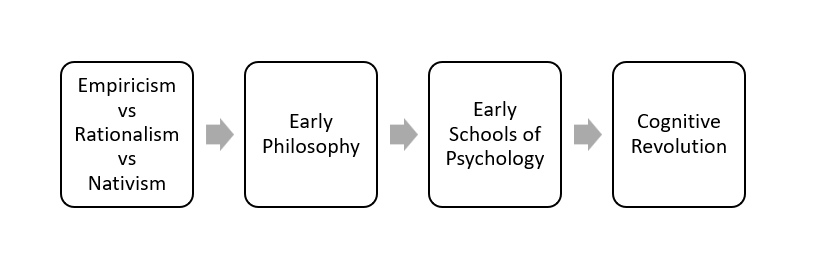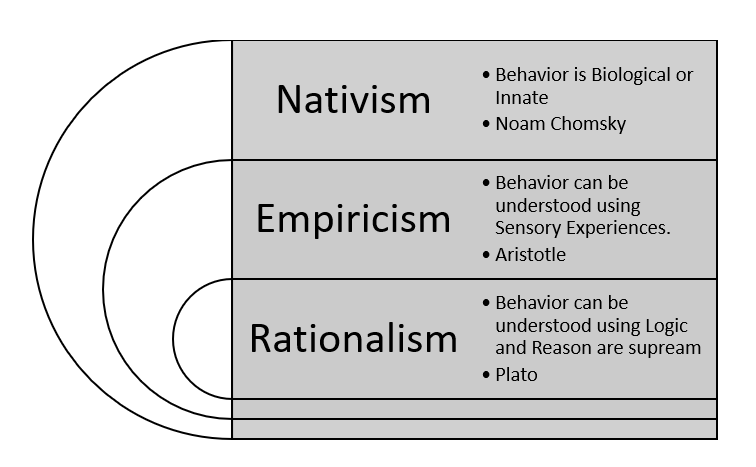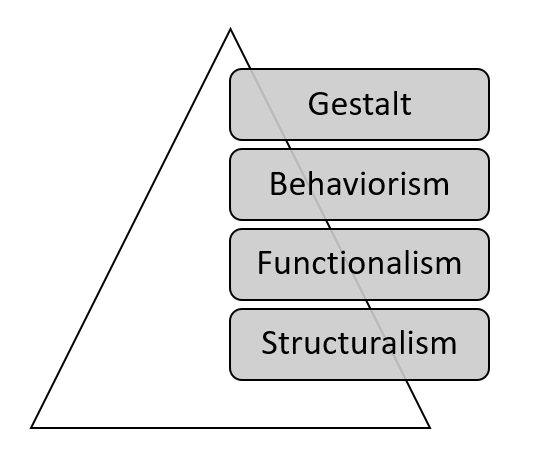Introduction
Although cognitive psychology is a relatively young field, its roots can be traced back to the philosophies of Aristotle. To truly appreciate the complex and fascinating history of cognitive psychology, it’s essential to understand its dual origins.
Dual Origins of Cognitive Psychology
Cognitive psychology emerged from both philosophy and physiology. Early philosophers in the 17th and 19th centuries, such as John Locke, David Hume, John Stuart Mill, René Descartes, George Berkeley, and Immanuel Kant, explored the nature and methods of studying the mind.
Locke, Hume, Berkeley, and Mill followed an empiricist perspective, aligned with Aristotle, emphasizing that knowledge comes from experience—gathered through the senses.
On the other hand, Descartes and Kant took a nativist stance, rooted in Plato’s ideas, which emphasized the role of innate factors like biology in the acquisition of knowledge.
In contrast to philosophy, physiologists were investigating the influence of biological processes on cognition. Researchers like Karl Lashley and Donald Hebb examined how physiological phenomena impact cognitive processes, focusing on the brain’s role in shaping thought, perception, and learning.
The emergence of cognitive psychology can be understood through four key phases.
Fig 1- Four Phases of Emergence of Cognitive Psychology

Phrases of Emergence of Cognitive Psychology
Empiricism vs. Rationalism vs. Nativism
The first phase of cognitive psychology’s emergence involves the intellectual conflict between empiricists, rationalists, and nativists.
Empiricists argue that knowledge is acquired through experience, primarily by observing the world and drawing from previous encounters. For empiricists, the environment plays a crucial role in shaping our understanding, as they believe that knowledge is built through sensory experiences.
An example of an empiricist principle is associationism, the idea that two unrelated ideas can become linked in the mind if they are presented together often enough, as noted by John Locke in 1690. This concept suggested that learning occurs by forming associations between ideas and experiences, emphasizing the external influence of the environment on knowledge formation.
In contrast, rationalists believed that knowledge could be derived from reason and logic. They argued that cognitive processes could be understood through introspection and logical reasoning rather than through observation alone. For rationalists, the mind operates independently of external experiences, with logic and reasoning being the primary tools for acquiring knowledge.
Nativism, another important perspective in this debate, took a different approach. Nativists argued that certain cognitive processes are innate—meaning that humans are born with built-in structures or tendencies that shape how we think and behave.
This “hardwiring” of the brain (Galotti, 2018) suggests that some aspects of cognition are not learned from the environment but are pre-programmed, as supported by more modern theorists like Noam Chomsky. Nativism posits that humans are biologically predisposed to acquire knowledge, such as language, through mechanisms already present in the brain.
Fig 2- Rationalism vs Empiricism vs Nativism

Rationalism vs Empiricism vs Nativism
Together, these three philosophical approaches—empiricism, rationalism, and nativism—laid the groundwork for the development of cognitive psychology.
They helped shape the early understanding of how the mind works and how knowledge is formed, sparking a field of study that would eventually merge philosophical speculation with scientific inquiry.
Early Philosophers
Though cognitive psychology is a relatively modern field, its origins can be traced back to ancient philosophers like Plato, Aristotle, and Hippocrates, each of whom had distinct views on cognition and the human mind.
Plato, a rationalist, believed that knowledge and cognition were innate, with truth accessible through reason and introspection.
Aristotle, on the other hand, was an empiricist who argued that knowledge comes from sensory experiences and observations of the world around us. Aristotle can reasonably be called the first cognitive psychologist (Leahey, 2003).
Hippocrates, often regarded as the father of medicine, approached cognition from a physiological perspective, emphasizing the influence of the brain and bodily processes on thought and behavior.
As intellectual discourse progressed, new figures emerged, playing crucial roles in shaping the early foundations of cognitive psychology. Two of the most important thinkers in this regard were René Descartes and John Locke.
René Descartes was a rationalist philosopher who introduced the concept of dualism, the idea that the mind and body are separate entities that interact with one another. Descartes used introspection to explore this mind-body relationship, positing that while the body is mechanical, the mind is a non-material entity responsible for thinking, reasoning, and consciousness. This dualistic perspective laid the groundwork for later debates about the nature of mental processes and how they are connected to the physical body.
On the other side of the debate was John Locke, an empiricist who rejected the notion of innate knowledge. Locke believed that the mind at birth is a tabula rasa (a “blank slate”)—that is, devoid of any pre-existing knowledge or cognitive structures.
According to Locke, all knowledge and cognition are the result of sensory experiences, and it is through our interactions with the environment that we develop understanding. He argued that ideas are built by associating various sensory inputs, with learning being a gradual accumulation of experiences rather than the realization of innate ideas.
These early philosophical perspectives—rationalism, empiricism, and the physiological approach—formed the philosophical underpinnings of cognitive psychology. They set the stage for the eventual scientific investigation of the mind, blending introspective and observational methods with questions about the nature of knowledge, cognition, and the mind-body relationship.
Early Schools of Psychology
The early schools of psychology sought to understand both cognition and behavior, often blending philosophical and scientific approaches. The structuralist school, led by pioneers like Wilhelm Wundt and Edward Titchener, focused on dissecting the structure of the mind through the process of ‘Introspection’. This method involved trained subjects analyzing their own conscious thoughts and sensations in an attempt to break down mental processes into their basic components. Although innovative for its time, introspection was criticized for being too subjective, as different individuals could produce varying interpretations of their experiences, making the results difficult to validate scientifically.
In contrast, William James shifted the focus from the structure to the function of the mind. He developed the school of functionalism, which emphasized the practical role of mental processes in helping individuals adapt to their environments. Drawing heavily from Darwin’s theory of evolution, James believed that the primary function of the mind was to aid in survival. Functionalists like John Dewey and Edward Thorndike expanded on this approach, emphasizing how cognition enables individuals to navigate and respond to the challenges posed by their environment.
By the 1930s, behaviorism had become the dominant school of thought in psychology. Behaviorists focused exclusively on observable behavior, arguing that since mental processes could not be directly seen or measured, they should not be the focus of scientific study. John Watson, a prominent behaviorist, dismissed mental representations as mere byproducts of behavioral processes, advocating for the study of only overt behaviors.
However, other behaviorists like B.F. Skinner recognized the importance of mental processes but cautioned against treating them as distinct from behavior. Edward Tolman, in particular, introduced the idea of cognitive maps, which suggested that mental representations play a key role in guiding behavior, blending behaviorism with cognitive theory.
Around the same time, in Germany, the Gestalt school was gaining prominence. Gestalt psychologists, including Max Wertheimer, Wolfgang Köhler, and Kurt Koffka, rejected the reductionist approaches of structuralism, functionalism, and behaviorism for being incomplete in their understanding of mental processes. The Gestalt school emphasized the idea that the mind perceives things as whole structures rather than as a collection of individual components. According to Gestalt theory, sensory information is organized into patterns or configurations that allow for a more holistic understanding of events, thus prioritizing how elements of perception come together to form unified experiences.
Fig 2- Early Schools of Psychology

Four Important Schools of Psychology
These early schools of psychology contributed to the evolving understanding of both cognition and behavior, each offering unique perspectives that laid the groundwork for later developments in cognitive psychology.
Cognitive Revolution
The Cognitive Revolution refers to a pivotal period during the early 1970s, marked by significant technological and psychobiological advancements that revolutionized the study of cognitive processes.
Beginning in the 1950s, the rise of technology—especially with the development of the Turing Test—demonstrated that machines could mimic intelligent behavior. This breakthrough allowed researchers to use machines as models for studying various cognitive functions, opening new avenues of inquiry.
During this period, humans were increasingly viewed as limited-capacity processors, similar to machines, capable of handling only a finite amount of information at any given time.
This conceptualization led to the development of human-machine systems, where machines were used to extend human capacity, particularly in tasks involving attention, memory, and problem-solving. These systems fostered the collaboration of engineers and psychologists, resulting in the creation of person-machine interfaces that boosted human efficiency.
The computer metaphor became central to cognitive psychology, with cognitive models—such as those related to memory and information processing—being framed in terms of inputs, outputs, and storage, mirroring the way computers function.
The aftermath of World War II further accelerated technological innovation, giving rise to critical inventions like the sonar, internet, and wireless communication. These technologies not only impacted military and industrial sectors but also provided new tools for understanding human cognition. Researchers began to explore how people process information, solve problems, and interact with machines in ways that were previously unimaginable.
Another significant development during the Cognitive Revolution was the blossoming of interdisciplinary research. Fields such as engineering, psychology, linguistics, and neuroscience converged to create more sophisticated models of the mind.
One of the most influential figures during this time was Noam Chomsky, whose work in linguistics challenged the behaviorist view of language learning. Chomsky introduced the concept of universal grammar and proposed the existence of an innate language acquisition device (LAD), which helped explain how humans are able to learn complex language systems so rapidly. His ideas marked a major departure from the behaviorist tradition, which had previously dominated psychological thought.
Simultaneously, neuroscientific developments added depth to our understanding of cognition. Researchers such as David Hubel and Torsten Wiesel conducted groundbreaking studies on visual perception, demonstrating how the brain processes visual information. Their work, along with that of Donald Hebb, who studied the relationship between neural circuits and cognitive functions, provided new insights into the biological underpinnings of thought, perception, and memory.
The Cognitive Revolution fundamentally transformed the landscape of psychology. By integrating technological, linguistic, and neuroscientific advances, it provided new methodologies and models that reshaped our understanding of how humans think, perceive, and learn. This period marked the transition from behaviorist psychology to a cognitive approach, which placed mental processes at the forefront of scientific inquiry.
Conclusion
The history of cognitive psychology reflects a rich and evolving interplay between philosophy, physiology, and scientific advancements. From its early roots in the philosophical debates of empiricism, rationalism, and nativism, cognitive psychology has expanded into a diverse field that blends introspective approaches with rigorous scientific inquiry. Early thinkers like Aristotle, Locke, and Descartes laid the groundwork for understanding the nature of the mind and cognition, while the emergence of various schools of psychology, including structuralism, functionalism, behaviorism, and Gestalt psychology, contributed to a deeper exploration of cognitive processes.
The Cognitive Revolution of the 20th century marked a transformative shift, driven by technological innovations, interdisciplinary research, and breakthroughs in neuroscience and linguistics. This period not only redefined our understanding of human cognition but also established cognitive psychology as a distinct and dynamic field. By embracing both philosophical insights and scientific methodologies, cognitive psychology continues to evolve, offering increasingly sophisticated models of how we think, perceive, learn, and interact with the world around us. The field’s ongoing growth underscores its foundational importance in unraveling the complexities of the human mind.
References
Farmer, T. A., & Matlin, M. W. (2019). Cognition. John Wiley & Sons.
Galotti, K. M. (2018). Cognitive psychology in and out of the laboratory. Thomson Brooks/Cole Publishing Co.
Leahey, T. H. (2003). Cognition and learning. In D. F. Freedheim (Ed.), Handbook of psychology (Vol. 1: The history of psychology, pp. 109–133). Hoboken, NJ: Wiley.
Locke, J., 1690, An Essay Concerning Human Understanding, in Peter H. Nidditch (ed.), An Essay Concerning Human Understanding, Oxford: Clarendon Press, 1975.
Subscribe to Careershodh
Get the latest updates and insights.
Join 13,984 other subscribers!
Niwlikar, B. A. (2024, September 4). The Revolutionary Emergence of Cognitive Psychology- 4 Important Phrases of Cognitive Psychology’s History. Careershodh. https://www.careershodh.com/the-emergence-of-cognitive-psychology/
